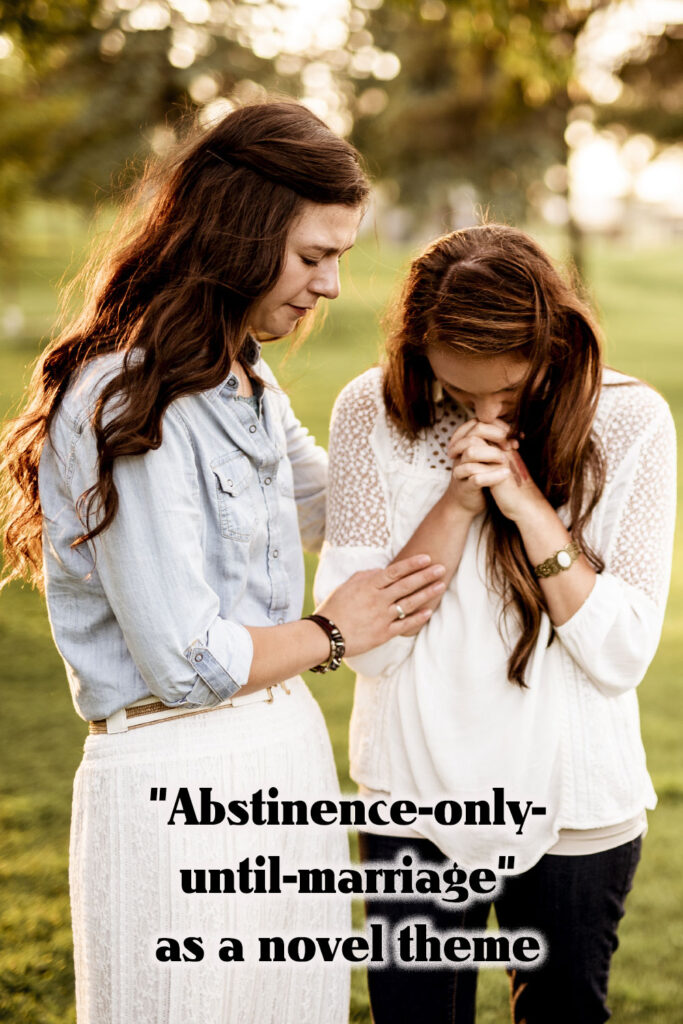Young people in church settings are often under pressure to conform to society’s norms and expectations. One of the greatest expectations placed on them is that they refrain from sexual activity until they are married. The argument often used is that the term “adultery” in the biblical context includes premarital sex, since it does not occur within the context of marriage. The expectation to live celibate lives is perpetuated by various programs and campaigns that promote the “no sex before marriage” idea. In this blog post, we will look at the pros and cons of these programs and discuss how the emotions involved can be handled in fiction.
And since this is a blog for writers, we’ll explore the question of how to develop believable storylines on this topic. Every novel and every narrative thrives on conflict. And especially when it comes to the topic of “premarital sex”, conflicts are pre-programmed, since Christians with their maxims of faith are in constant friction with the spirit of the times – with the “fallen world”. At the latest when individual church members have to leave their bubble, for example because they start studying and therefore move away from home, they encounter people who think differently and their value system.
First, let’s discuss the benefits of “no-sex-before-marriage” programs. These campaigns often promote abstinence as a means of preventing unplanned pregnancies and sexually transmitted infections. By abstaining from sexual activity, people can avoid these potential risks altogether. In addition, these programs encourage people to focus on building strong emotional relationships before engaging in physical intimacy. This can lead to healthier and more meaningful relationships later on.
On the other hand, there are some drawbacks to these programs. One of the biggest problems is that they often shame and stigmatize people who choose to engage in sexual activity outside of marriage. These feelings of guilt and shame can have long-lasting psychological effects. Time and again, this leads to self-esteem problems, anxiety, and even depression. Therefore, it would be more important for educational programs to teach a healthy understanding of sexuality based on consent, respect, and safety, rather than promoting shame and guilt.
That’s because the success rate of no-sex-before-marriage programs is surprisingly low. “In a study of 527 students at Northern Kentucky University, students were asked if they were committed to their long-term promise to live abstinently until marriage. Sixteen percent had made such a promise. And nearly 2/3 of them broke that promise,” writes Marty Klein in his book “American’s War on Sex.” (Source) Of those who actually remained “abstinent,” more than half had oral sex, but described themselves as “celibate,” which is technically kind of true, but also just an attempt to deceive themselves (or their parents, or their community). Because ultimately, student oral sex also falls under the category of “premarital sex” in the vast majority of cases.
In April 2007, a federally funded study of four abstinence programs by Mathematica Policy Research Inc. found that participants had as many sexual partners as non-participants and had sex at the same average age as non-participants. (Source)
When developing credible storylines for this population, it is important to consider the diversity of experiences and perspectives as well as church backgrounds. Some people choose to abstain from sexual activity until marriage, others do not. Developing characters and storylines that address these different perspectives can help foster mutual understanding. Moreover, a novel that takes seriously the different perspectives and the emotions that go with them will reach more people than a piece of writing that very obviously declares one of the perspectives to be the only correct one.
Some of the conflicts that can arise when discussing “no sex before marriage” programs are rooted in societal and cultural expectations. In many cultures, especially those with strong religious ties, great emphasis is placed on sexual purity before marriage. This idea of purity and chastity can be deeply rooted and impact many aspects of life, including education, dating, and personal well-being.
On the other hand, there are also many societies and cultures that have more liberal attitudes toward sexuality and where premarital sex is considered a normal part of human behavior. In these contexts, “no sex before marriage” programs can be seen as outdated, restrictive, and even harmful, often failing to adequately prepare youth for the realities of sexual relationships.
By addressing these conflicts in a nuanced and thoughtful way, we as storytellers can illuminate the complexity of these issues and the impact they can have on people and relationships. Integrative and thoughtful storytelling that explores these nuances can help broaden the discussion and illuminate the impact of these programs on individuals and society as a whole.


